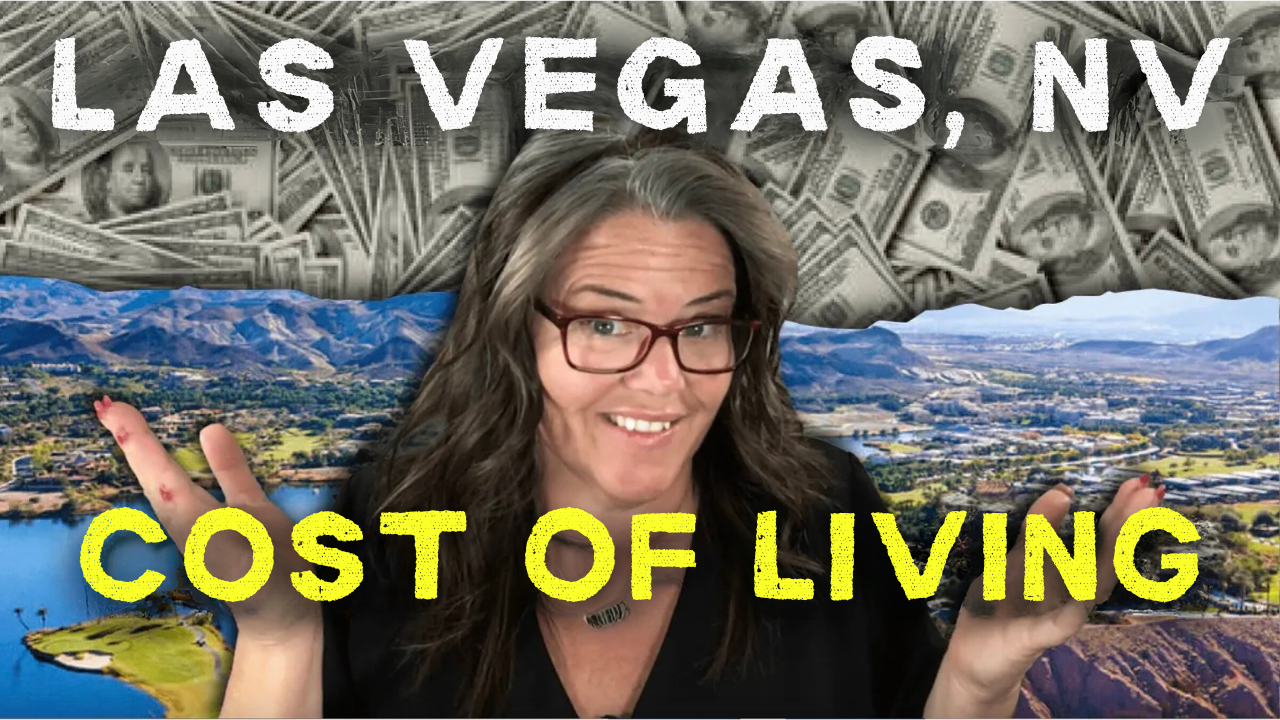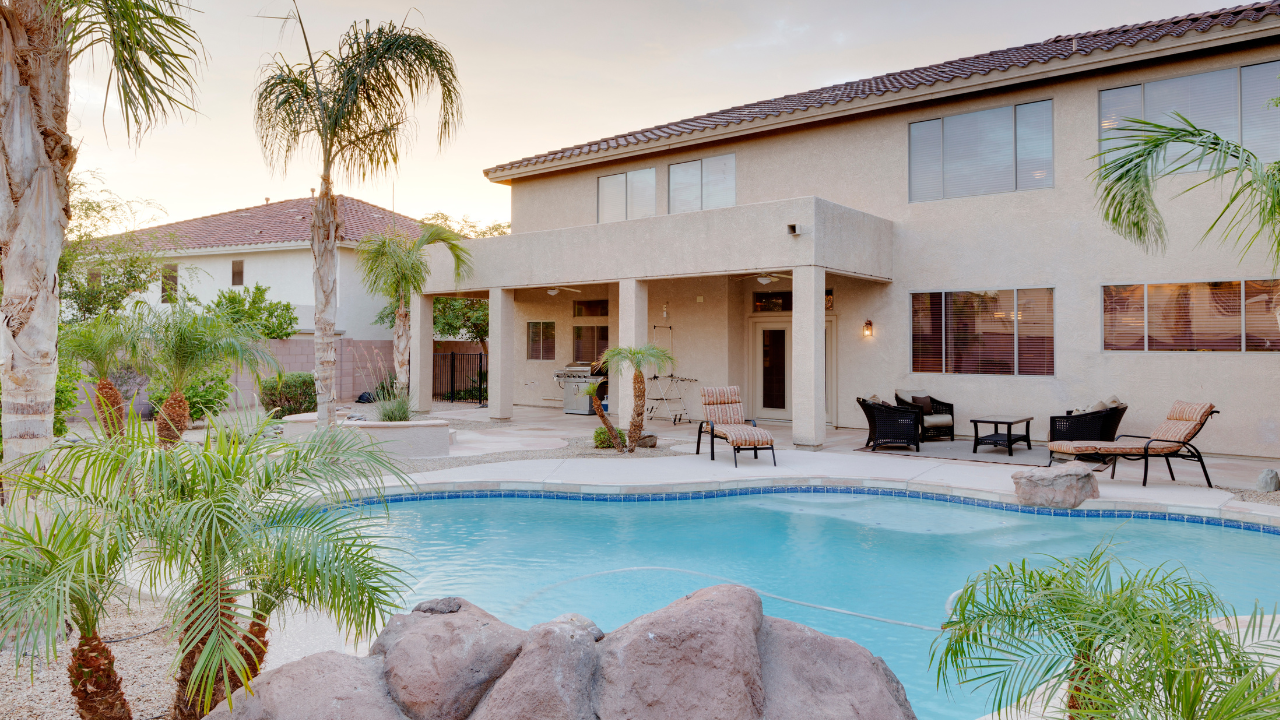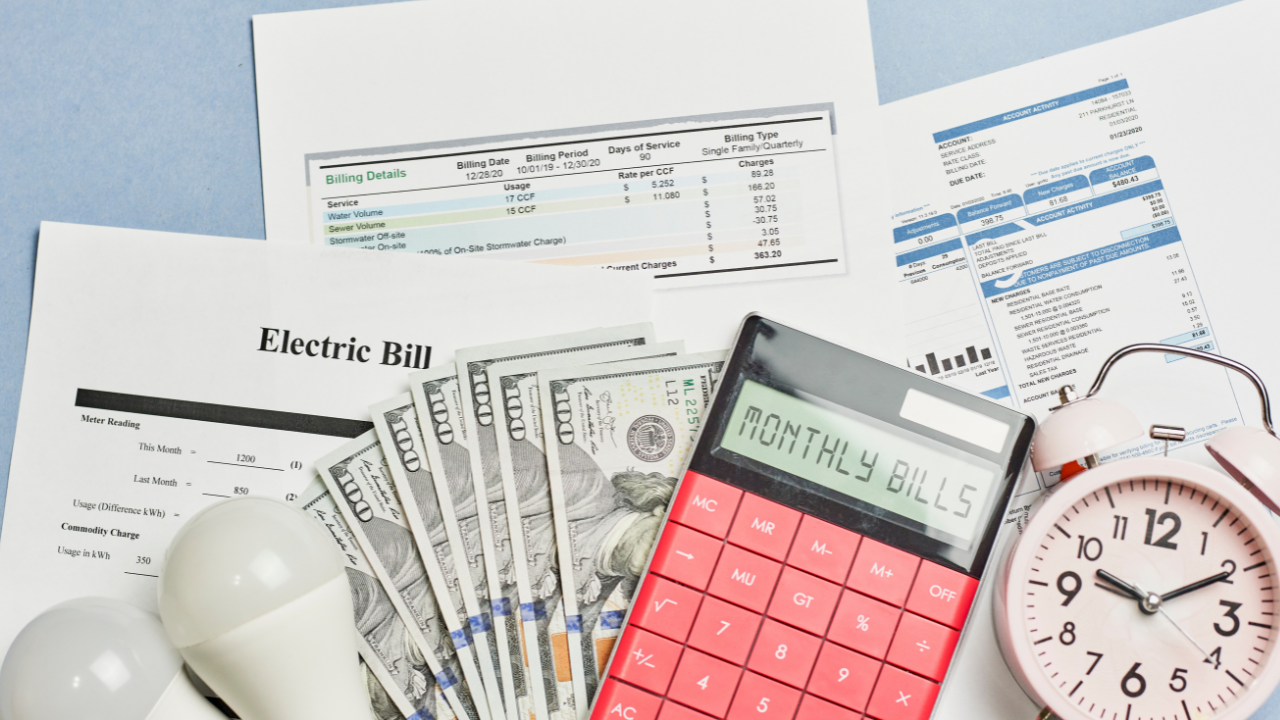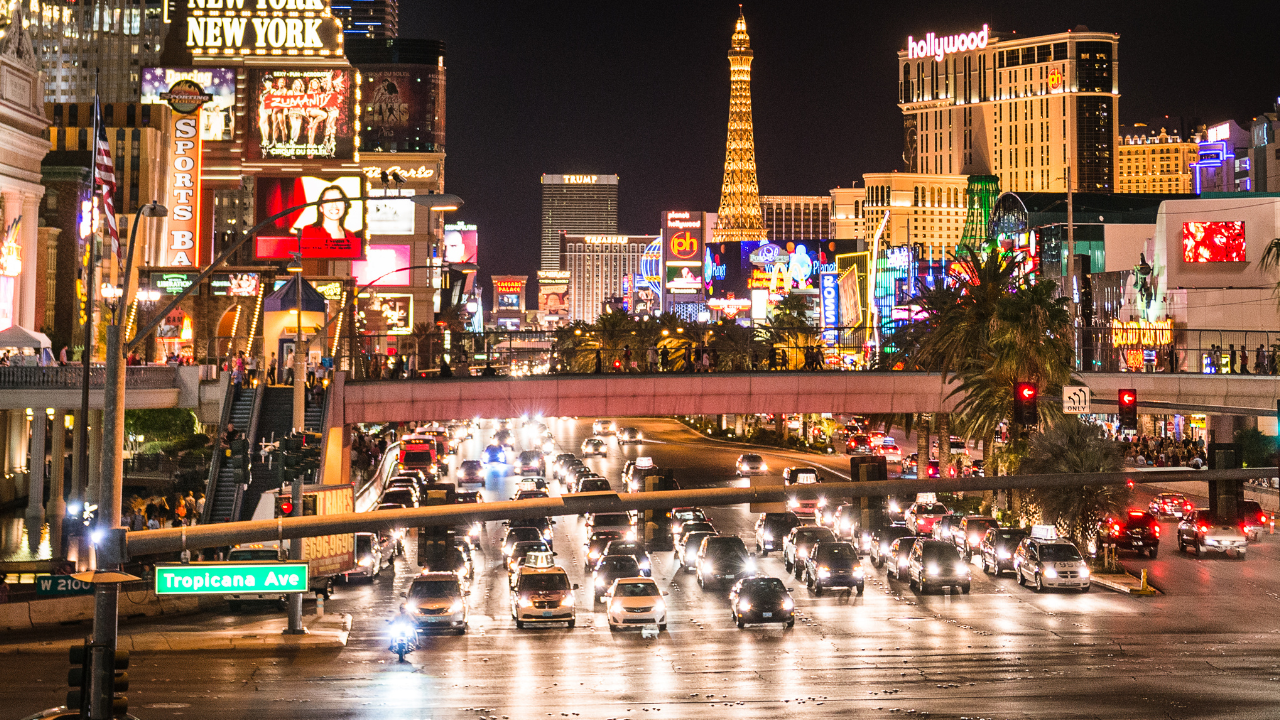COST OF Living IN Las Vegas, NV: A COMPREHENSIVE ANALYSIS
Discover the real cost of living in Las Vegas, Nevada
Are you dreaming of making a move to Las Vegas, Nevada?
Well, you’re in for a treat because we’re about to uncover the real deal about the cost of living in this vibrant city.
I’m Windy Goss, your real estate expert from eXp Realty, and I’ve been helping people like you relocate to Las Vegas for nearly two decades.
Not only am I a realtor, but I’m also a proud resident, mom, and wife. I’m excited to share some insider insights with you, so let’s dive in!

Las Vegas, often known for its casinos and entertainment, has a cost of living that is influenced by various factors:
Table of Contents:
Housing: Historically, Las Vegas has had more affordable housing compared to other major U.S. cities. However, in recent years, there’s been an upward trend in housing prices, though they remain relatively moderate.
Utilities: Due to its desert climate, summertime electricity costs, primarily for cooling, can be higher. Water costs are also a concern given the area’s arid conditions.
Transportation: While public transit is reasonably priced, Las Vegas is largely a car-dependent city. Gas prices are in line with the national average, but car insurance rates can be higher than in other states.
Food and Groceries: Grocery prices are on par with the national average. Dining out, especially on the Strip, can be pricier, but there are numerous affordable options throughout the city.
Healthcare: Healthcare costs in Las Vegas are slightly above the national average. However, it’s essential to note the variance based on specific services and insurance coverage.
Entertainment: While premium shows and attractions on the Strip can be costly, the city offers a variety of entertainment options at different price points. There are also numerous free attractions and events.
Taxes: Nevada has no state income tax, which can be a significant saving for residents. However, sales tax rates in Clark County, where Las Vegas is located, are around 8.375%.


Housing in Las Vegas: Cost of Living Overview
Las Vegas, while globally recognized for its glitz, glamour, and gaming, also offers a diverse range of housing options for its residents. Housing often constitutes the most significant portion of an individual’s monthly expenses, and understanding the Las Vegas housing market can be pivotal for potential residents or those considering relocation. Here’s a comprehensive breakdown:
1. Renting:
Apartments: Depending on the area, a one-bedroom apartment in Las Vegas might range from $900 to $1,400 per month. In upscale neighborhoods or closer to the Strip, this price can be considerably higher.
Houses: Renting a three-bedroom house can cost anywhere from $1,500 to $2,500 or more, depending on the location and amenities.
2. Buying a Home:
The median home value in Las Vegas has been fluctuating, but as of recent data, it’s around $340,000. However, prices can vary widely based on the neighborhood, size, and condition of the property.
Down payments, interest rates, and mortgage terms will further influence monthly costs for homeowners.
3. Property Taxes:
Nevada’s property taxes are relatively low compared to other states. In Clark County, where Las Vegas is located, the average effective property tax rate is about 0.69%. For a home valued at $300,000, this translates to an annual tax of approximately $2,070.
4. Homeowner’s Insurance:
On average, the homeowner’s insurance rate in Las Vegas is around $700 to $1,200 annually, but this can vary based on the home’s value, location, and other factors.
5. Homeowners Association (HOA) Fees:
Many residential communities in Las Vegas have HOA fees, especially in newer subdivisions and condo complexes. These fees cover community maintenance, amenities, and sometimes utilities. They can range from $50 to several hundred dollars monthly.
Housing in Las Vegas offers a mix of options, from apartment living to spacious homes. While rental and property prices have seen growth with the city’s expansion and popularity, they remain competitive when compared to other major U.S. cities. Potential residents should consider factors like location, type of dwelling, and associated costs like taxes and insurance when budgeting for housing in Las Vegas.
Additionally, the potential for fluctuating housing prices means that both renters and buyers should stay informed about market trends to get the best value for their money.


Utilities in Las Vegas: Cost of Living Overview
While Las Vegas is known for its casinos and entertainment, residents are more concerned about day-to-day living costs, including utilities. In the desert climate of Las Vegas, utilities, especially air conditioning in the summer months, can become a significant expense. Here’s a breakdown of what you can expect:
1. Electricity:
Due to the city’s extreme temperatures in summer, electricity bills can surge during these months because of the continuous use of air conditioning. On average, a monthly bill for a standard 915 sq. ft. apartment can range from $120 to $180, but this can increase for larger homes or extended usage.
2. Water and Sewer:
Given that Las Vegas is in a desert, water is a precious resource, and conservation efforts are in place. The average monthly cost for water and sewer for a typical apartment can be around $50 to $70, but again, larger properties with landscaping may see higher bills.
3. Natural Gas:
Many homes in Las Vegas use natural gas for heating, cooking, and water heating. The average monthly gas bill can vary widely based on usage and home size but generally falls in the $30 to $60 range.
4. Trash and Recycling:
These services are often included in water bills or HOA fees, but if charged separately, they might cost around $15 to $25 per month.
5. Internet:
High-speed internet, essential for work, entertainment, and communication, typically costs between $50 to $80 per month, depending on the provider and plan chosen.
6. Cable TV:
For those opting for cable TV services, packages start at around $50 and can go up to $150 or more based on the channels and services selected.
Utility costs in Las Vegas can fluctuate based on the season, especially electricity due to the city’s hot summers. While some expenses, such as water, might be higher due to the city’s desert location, others are on par with national averages. It’s essential to consider these costs when budgeting for life in Las Vegas, and implementing energy-saving measures can lead to significant savings over time. As with any city, shopping around for providers, especially for services like internet and cable, can also help residents get the best deal and manage their utility expenses effectively.


Transportation in Las Vegas: Cost of Living Breakdown
Las Vegas, predominantly recognized for its vibrant nightlife and casinos, also presents an array of transportation options for both residents and visitors. Understanding the associated costs can provide a clearer picture of the overall cost of living in the city.
1. Public Transportation:
RTC Transit Buses: The city’s primary bus system offers routes throughout the city and the Strip. A 2-hour pass might cost around $6, whereas a 24-hour pass is typically priced at $8. For frequent users, monthly passes are available for approximately $65.
2. Ride-Sharing and Taxis:
Uber and Lyft: Depending on time and demand, a ride from the airport to the mid-Strip might cost between $10 to $20.
Taxis: Generally, they’re slightly more expensive than ride-shares. A similar airport-to-Strip journey could range from $20 to $30, excluding tips.
3. Personal Vehicles:
Gas Prices: As of recent data, the average gas price in Las Vegas hovers around $3.50 to $4 per gallon, aligning with national averages.
Parking: While many hotels previously offered free parking, there’s been a trend towards paid parking, especially on the Strip, with daily rates ranging from $10 to $30.
4. Bike Rentals:
RTC Bike Share: In the downtown area, you can rent bikes. Prices are about $5 for a 30-minute access or $15 for a 24-hour pass.
5. Car Rentals:
Rates can vary widely based on the type of vehicle and duration. On average, one might expect to pay anywhere from $30 to $100 per day for a rental car in Las Vegas.
6. Monorail:
Connecting several major hotels and the Las Vegas Convention Center, the monorail is an efficient way to navigate the Strip. Single ride tickets cost around $5, while a 24-hour pass is priced at $13.
Transportation in Las Vegas offers versatility, catering to both those who prefer public transportation and individuals who enjoy the convenience of personal vehicles. While the costs of some services, like taxis and premium parking spots, can be higher, especially in tourist-heavy areas, there are economical alternatives available, such as the RTC buses and bike-sharing. As with other aspects of living in Las Vegas, being aware of various options and planning in advance can lead to substantial savings in transportation expenses.


Las Vegas – Food and Groceries Cost of Living
Las Vegas, better known for its neon lights and entertainment hubs, has seen a transformation in its demographics and urban structure, directly influencing the cost of living, particularly in the realm of food and groceries. Here’s an exploration of what residents and potential movers can expect:
Dining Out: The Strip, undeniably, has some of the most upscale restaurants where a meal can be quite expensive. However, moving away from tourist-centric areas, one can find a variety of dining options that cater to different budgets. On average, a meal at a mid-range restaurant for two might cost between $50 to $70.
Fast Food and Casual Dining: Las Vegas, like other American cities, has numerous fast-food chains. A combo meal at a fast-food restaurant is typically priced between $7 to $10.
Groceries: Major grocery store chains like Albertsons, Smith’s, and Walmart offer competitive prices. Basic items such as a gallon of milk might cost around $3 to $4, a loaf of bread approximately $2 to $3, and a dozen eggs around $2 to $2.50.
Specialty and Ethnic Markets: While these markets offer unique and diverse products, they might have slightly higher prices for specialized items compared to mainstream supermarkets. However, for certain ethnic ingredients, they might be the most cost-effective option.
Fresh Produce: Buying from local farmers’ markets can sometimes be more expensive than supermarkets due to the organic and locally-sourced nature of the products. However, many residents find the quality worth the extra cost.
Alcoholic Beverages: The price for alcoholic beverages, especially at bars and restaurants on the Strip, can be high. However, purchasing from liquor stores for home consumption is more economical. A mid-range bottle of wine, for instance, might cost between $10 to $15.
Special Dietary Needs: Vegan, gluten-free, or organic products might be priced higher than conventional food items. Stores like Whole Foods or Sprouts Farmers Market specialize in such products, and while they offer quality, they might impact the monthly grocery bill significantly.
Summary: Las Vegas offers a vast spectrum when it comes to food, from high-end dining experiences to budget-friendly options. While dining at premium restaurants can be pricey, the city’s grocery landscape provides options for various budgets. The cost of food and groceries is generally on par with the national average, but specific choices, like frequenting specialty stores or opting for organic products, can influence individual expenses. As always, savvy shopping, using discounts, and exploring local deals can help in managing food-related expenses effectively in the city.


Health Care Cost of Living in Las Vegas: An Overview
Las Vegas, known for its entertainment and nightlife, is also home to a growing population that requires comprehensive health care services. Health care costs are a significant factor for many individuals and families, and understanding these expenses is crucial for those living in or considering a move to Las Vegas. Here’s a breakdown of health care costs in the city:
1. Health Insurance:
Individual Coverage: The average monthly premium for individual health insurance in Nevada is around $400-$500, but this can vary based on age, health, and the type of plan chosen.
Family Coverage: For a family, the monthly premium can range from $1,200 to $1,800 or more, depending on the coverage level and number of family members.
2. Out-of-Pocket Costs:
Doctor Visits: A general doctor visit without insurance might cost anywhere from $100 to $250, while specialists can charge $200 to $500 or more per visit.
Prescriptions: The cost of medications varies widely based on the drug, but generic prescriptions might range from $10 to $50, while brand-name drugs can cost several hundred dollars without insurance.
3. Hospital Services:
A night in a Las Vegas hospital, without complications, might cost around $2,000 to $3,000. Surgical procedures, intensive care, or specialized treatments can significantly increase these costs.
4. Dental Care:
A routine dental check-up can range from $50 to $150. More complex procedures like root canals or crowns can cost anywhere from $500 to $2,000 or more, depending on the dentist and specifics of the procedure.
5. Vision Care:
An eye exam in Las Vegas might cost between $50 and $150. Prescription glasses or contact lenses can range from $100 to several hundred dollars based on brand, lens type, and other factors.
6. Preventative and Alternative Care:
Services like chiropractic adjustments, acupuncture, or massage therapy can range from $50 to $150 per session, though prices vary based on the provider and type of service.
The cost of health care in Las Vegas aligns with many national averages, but individual experiences can vary based on insurance coverage, health needs, and chosen providers. It’s crucial for residents to have adequate health insurance to mitigate potential high out-of-pocket costs, especially for unexpected medical issues. Additionally, shopping around, using generic medications, and utilizing preventative care can also help residents manage and potentially reduce their health care expenses in Las Vegas.


Entertainment Cost of Living in Las Vegas: A Comprehensive Guide
Las Vegas, affectionately dubbed “The Entertainment Capital of the World,” is synonymous with fun and leisure. From its iconic casinos to spectacular shows, there’s no shortage of entertainment options. However, residents and newcomers might wonder about the everyday cost of entertainment in this vibrant city. Let’s delve into the breakdown:
1. Shows and Concerts:
Headliner Shows: Seeing a top-tier performer or production on the Strip can range from $70 to $200 or more per ticket, depending on seating and show popularity.
Off-Strip Shows: Smaller venues or lesser-known acts might offer tickets for $30 to $70.
2. Casinos:
Gambling, of course, has variable costs. However, joining loyalty programs can offer perks like free play, discounted meals, or complimentary show tickets.
3. Dining:
High-End Restaurants: Dining at a premier restaurant on the Strip can easily cost $50 to $150 per person, excluding drinks.
Casual Dining: Off-Strip eateries or chain restaurants usually charge $10 to $30 per plate.
4. Nightlife:
Nightclubs: Entry fees for popular clubs can range from $20 to $50 for women and $30 to $75 for men. Drinks inside often start at $10 to $20.
Bars and Lounges: A typical drink at a local bar might cost $5 to $15, depending on the establishment.
5. Movies and Theaters:
Movie tickets in Las Vegas average $10 to $15, with premium formats costing more. Local theater productions outside the Strip might charge $20 to $50 for a ticket.
6. Recreational Activities:
Golf: Playing a round of golf can range from $30 at municipal courses to $200 or more at elite resort courses.
Bowling: A game might cost $3 to $6, with shoe rentals adding another $2 to $5.
Parks and Nature: Many local parks are free, but attractions like the Red Rock Canyon National Conservation Area have entrance fees, typically around $15 per vehicle.
7. Memberships and Subscriptions:
Gym memberships vary, but on average, you might pay $20 to $50 per month. Streaming services for music, movies, or TV can add another $10 to $50 monthly, depending on the number of subscriptions.
Las Vegas, with its wide array of entertainment options, provides both high-end experiences and budget-friendly choices. While the Strip’s allure can come with a steeper price tag, many affordable local spots offer excellent entertainment value. Balancing splurges with cost-effective options can help residents and visitors enjoy all that Las Vegas has to offer without breaking the bank.


Taxes in Las Vegas: Impact on Cost of Living
Las Vegas, situated in the state of Nevada, offers a unique taxation landscape that plays a significant role in the cost of living for its residents. When considering relocation or just understanding day-to-day expenses, it’s essential to grasp the tax implications. Here’s a detailed breakdown:
1. Income Tax:
State Income Tax: One of the most attractive financial aspects of living in Las Vegas is the absence of state income tax. Nevada is one of the few states in the U.S. that does not tax individual income, which can lead to substantial savings for residents, especially those with higher earnings.
2. Sales Tax:
In Clark County, where Las Vegas is located, the combined state and local sales tax rate is 8.375%. This rate applies to most goods and services, though there are exemptions, such as some food items.
3. Property Tax:
While Nevada’s property taxes are relatively low compared to other states, rates can vary within the state. In Clark County, the effective property tax rate is approximately 0.69%. It’s worth noting that Nevada caps the growth of property tax assessments, which can protect homeowners from sharp increases in their tax bill.
4. Hotel Room Tax:
Las Vegas charges a hotel room tax, which impacts tourists more than residents. However, locals might encounter this tax during staycations. The rate can vary based on the location within Clark County but generally ranges from 10% to 13%.
5. Vehicle Registration Tax:
Nevada charges a governmental services tax upon vehicle registration. The cost is based on the vehicle’s age and original Manufacturer’s Suggested Retail Price (MSRP). Newer, more expensive cars will have higher registration fees.
6. Business Tax:
While Nevada does not have a corporate income tax, it does impose a Commerce Tax on businesses with gross revenue exceeding $4 million per year. The rate varies by industry.
7. Other Considerations:
Sin Tax: Given Las Vegas’s reputation, it’s worth noting that Nevada imposes higher-than-average taxes on items like tobacco and alcohol.
Estate Tax: Nevada does not levy any estate or inheritance tax.
Las Vegas offers a unique tax environment that often benefits its residents, particularly with the lack of state income tax. However, like all regions, it has a blend of taxes that contribute to the overall cost of living. Understanding this blend is crucial for those looking to move to the area or for current residents aiming to manage their finances effectively.
Considering moving to Las Vegas, Nevada ?
WINDY GOSS
YOUR REAL ESTATE BOSS
[email protected]
(702) 334-1669
ADDRESS
10845 W Griffith Peak Dr., #2
Las Vegas, NV 89135.






